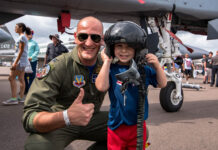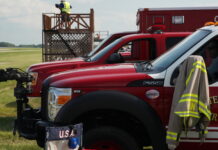If you are a regular reader of this column, you will know that I ran a marathon back in 2016. Ever since that race, I have maintained a steady routine of jogging on a weekly basis. I have averaged between 15 and 20 miles a week over the past two years.
I also have three young children, so — for my wife’s sake — I will often take the most boisterous of my children along with me in a stroller which invariably makes the run harder. A few weeks back, I was out for a run with my youngest when we passed a man walking his dog. I panted a “hello” to him and he told me, “That doesn’t look like much fun at all.” For a few strides, I painfully agreed with his observation as I kept pushing the heavy stroller. After a few more steps, I had an epiphany and turned back with a chuckle, saying, “Yeah, but it’s a lot easier than watching what I eat!”
As I thought about that interaction over the next days and weeks, I could not help but hear my father’s voice in the back of my head. My father would tell my brothers and me as we complained about the heat and strain of working on a farm in the summer: “It’s called work for a reason.” There are many idioms that express this sentiment. “You reap what you sow.” “Work now, play later.” “The early bird gets the worm.” And, “How do you get to Carnegie Hall? Practice, practice, practice.” Each of these contains in them a chord of the life lesson that for every single thing we do, we must sacrifice something else.
Throughout my career, I have seen this lesson unfold before my eyes across many facets of the industry. Part of my job is to have difficult conversations with people. These conversations are not typically something that those with my personality type enjoy, but I have found—through experience—that failing to address a matter quickly can lead to resentment and — instead of solving it – can further complicate things. There is a trade-off: I can face the unpleasantness of addressing it now, or forego that discomfort only to have the unaddressed issue worsen.
I have seen air show professionals suffer unnecessary problems under similar circumstances. I have seen talented professionals doing something, “…the way I taught myself.” I have heard performers say, “This is how I learned it,” when referring to a technique that would have been spotted and corrected by a strong coach or instructor. I have also seen an air show experience two-hour parking lines because the show’s management failed to consult with a parking specialist and properly anticipate fairly predictable traffic challenges. Whether it is flying an aerobatic maneuver or executing a business practice, it is easy to fall into the myopic trap of doing things, “…the way they have always done them,” and then endure the consequences of continuing the same inefficient, improper or even unsafe practices.
On the other hand, I have seen great successes when air show professionals have challenged themselves to learn from others. It is possible to come to this industry with some firsthand knowledge, gather input from others, and synthesize both into a unique and special product. It’s an approach that requires humility, good business sense and is, in the short term, a more difficult path to follow. It can be hard to ask for input, to have the hard conversation, to question the norms, to seek advice, to learn from constructive criticism, but — in every single case — the opportunity cost favors the most direct approach.
When I think back to every career decision or particularly trying time in my own life, I can pinpoint a moment days, weeks or months in advance when I could have done a little more work to avoid the pitfalls of the present. I did not successfully absorb and retain the advice of my father or all the idioms. Not until I was jogging and pushing a two-year old in a stroller did I realize that what everyone else had been saying was true: “You’ve got to put in the work now to enjoy success (or ice cream) later.”








